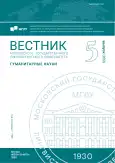Neologims through the Lens of Amplifying Media Agenda
- Autores: Temnova E.V.1
-
Afiliações:
- MGIMO University
- Edição: Nº 5(899) (2025)
- Páginas: 84-90
- Seção: Linguistics
- URL: https://journal-vniispk.ru/2542-2197/article/view/297128
- ID: 297128
Citar
Texto integral
Resumo
The objective of the research is to examine the role of neologisms in shaping the media agenda. Based on the issues of English and Russian media discourse, neologisms in crypto industry and digital finance produced using affixes such as -coin / -коин are identified. Also neologisms that denote concepts of artificial intelligence and digital technologies with a particular emphasis on the Russian term фиджитал are considered. In media discourse, neologisms play a particular role in shaping public opinion on novel items of social life and significant events through the lens of the commonly shared worldview, thus sculpting a new view of life. Constructing a mental frame by means of introducing neologisms, new meanings are attitudes shaped in media recipients, which eventually amplifies the media agenda.
Palavras-chave
Sobre autores
Elena Temnova
MGIMO University
Autor responsável pela correspondência
Email: el.v.temnova@my.mgimo.ru
PhD (Philology), Assistant Professor, English Department #2
RússiaBibliografia
- Guseynova, I. A., Gorozhanov, A. I. (2024). Un-Words as a Factor of Ideologization in the Modern German Political Discourse. Science Journal of Volgograd State University. Linguistics, 23(4), 84–95. DOI: 10.15688/ jvolsu2.2024.4.7.
- Scheufele, D. A. (1999). Framing as a theory of media effects. Journal of communication, 49(1), 103–122.
- Vinogradov, V. S. (2001). Vvedenie v perevodovedenie = Introduction to Translation Studies. Moscow: Publishing house of the Institute of General Secondary Education RAO. (In Russ.)
- Zabotkina, V. I. (1989). Novaya leksika sovremennogo angliyskogo yazyka. New vocabulary of the modern English language. Moscow: Higher School. (In Russ.)
- Bragina, A. A. (1973). Neologizmy v russkom yazyke = Neologisms in the Russian language. Moscow: Prosvescheniye. (In Russ.)
- Kurbanova, M. S. (2022). Neologizm kak yazykovoy fenomen v sredstvakh massovoy informatsii = Neologism as a linguistic phenomenon in the media. Moscow: Young Scientist. (In Russ.)
- Snisar, A. Yu. (2017). American mass media text as a sphere of actualization of neologisms. Tomsk State Pedagogical University Bulletin, 10(187), 112–117. doi: 10.23951/1609-624X-2017-10-112-117. (In Russ.)
- McСombs, M., Shaw, D. L. (1972). Agenda-setting Function of Mass Media. Public Opinion Quarterly, 36(2), 176–187.
- Dunas, D. V. et al. (2022). Agenda setting and the framing effect: on the need for conceptual unity in media studies of «digital youth». Vestnik of Moscow University. Ser. 10. Journalism, 4, 47–78. (In Russ.)
- Moskaleva, E. V. (2003). Pragmaticheskie osobennosti funktsionirovaniya angliyskikh i russkikh neologizmov = Pragmatic features of the functioning of English and Russian neologisms (based on fiction and journalistic texts): PhD thesis in Philology. Moscow. (In Russ.)
- Temnova, E. V. (2019). Felicitous vs dismal worldview in modern English media discourse. National Psychological Journal, 1, 109–121. doi: 10.11621/npj.2019.0110. (In Russ.)
- Gorozhanov, A. I. (2022). Interpretation and translation of fiction text using software tools for natural language processing. Neborskaya, L. N. [et al.] (Eds.), Universal and national in the linguistic picture of the world (pp. 6–8): Proceedings of the V International scientific conference, Minsk, October 21–23, 2022. Minsk State Linguistic University. Minsk. EDN DXIUHZ. (In Russ.)
Arquivos suplementares










